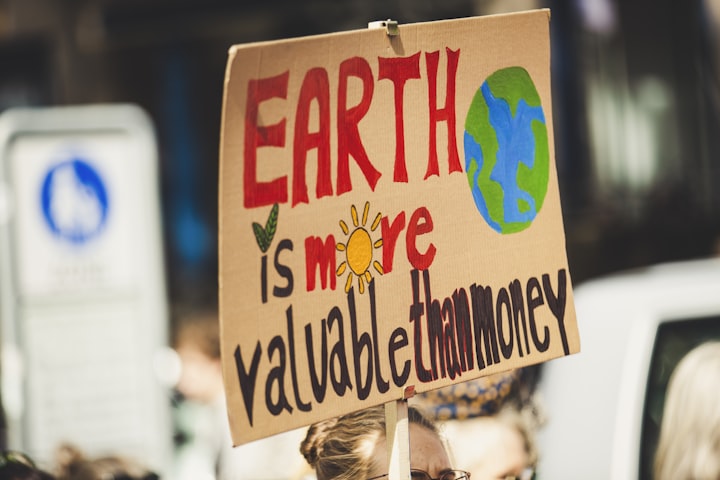Geopolitics of Climate Change
One of the most interesting things about geopolitics is just how capricious it is. Geopolitics, in plain terms, is the study of how political power dynamics play out in the face of geographical set-ups. These set-ups could range from plain geological formations such as mountains and oceans to more complex elements such as cultural divides and historical contexts. Every geopolitical entity, be it small city-states or massive international alliances, has kept geography at the core of its foreign policy. This geography, however, has changed rapidly in the past decade and as climate change aggravates, policies are only slated to get more and more volatile.

Twenty of the hottest years ever recorded have happened in the past twenty-one years. Wildfire seasons, droughts, floods, hurricanes are already breaching their records year after year. These extreme weather events are also getting more and more difficult to predict, both, spatially as well as in terms of their time-frames. They cause huge damages to life and property and have proven to be very expensive for countries. These extreme weather events, however, are only a glimpse into an ominous future. What's bothering governments more are the rapidly changing climatic conditions that in turn affect agriculture, resources, trade, and infrastructure projects. All of these concerns are driving climate action plans and this is where geopolitics comes in. As climate change and climate action gain more and more traction, the world is set to witness significant changes in conventional geopolitics. For instance, as countries are reducing their oil and gas dependence, petrostates are scrambling to diversify their economies and brace for a new normal.
In the course of this article, I write about some of the key features that, according to me, will drive geopolitics in the next century and possibly beyond. This, by no means, is an exhaustive list, and geopolitics is surely based on a lot more factors that what one can pen down in a single article.
Energy - Ever since the commencement of the Industrial Revolution in the late 18th century, energy has become a crucial element of geopolitics. Energy is fundamental to our civilization and a key determinant of national prosperity. The past few decades have witnessed a massive shift in energy patterns. As countries shift from imported oil, gas and coal to indigenous renewable energy sources (mainly wind and solar), countries that have historically benefited off of these resources and built their economies on the same are rapidly looking to diversify their economies. Meanwhile, countries such as Russia and Saudi Arabia, which have enjoyed significant power and influence in the past, are set to lose the limelight. Apart from this, renewable energy can be generated in one form or the other in almost every country of the world. This implies that major energy choke points of the world such as the Strait of Malacca, the Strait of Hormuz, the Suez Canal, and the likes are also likely to lose their strategic significance. Lastly, given the decentralized nature of renewable energy, major domestic socio-economic changes are also very probable. The big oil and gas corporations are likely to fall as more and more homes and businesses become energy self-sufficient.
Water (and Food) - Some say that water is the new oil. With freshwater sources depleting rapidly across the world, ‘hydro politics will be a key determinant of 21st-century geopolitics. Water fuels a country’s agriculture, commerce, trade, and industry. What makes water different from other key resources is that it takes the form of flow instead of stocks or units. Major rivers and lakes are shared between countries and hinge on paper-thin treaties. A case in point is the ongoing clash over the Nile between Egypt and Ethiopia. While Addis Ababa can justify the construction of a $4 billion hydroelectric dam power project for driving its own industry and economy, Cairo, downstream, is concerned about the lives and livelihoods of millions who rely on the river. With changing hydrological cycles and more and more regions facing extreme weather conditions such as droughts and floods, water-centered conflicts are likely to mirror the 20th-century oil wars. Some of the potential regions for future hydro-conflicts include the water bodies originating in the Himalayas and the surrounding regions in China, India, Bangladesh, and Pakistan; the Jordan river basin in the middle east; the states around the Great Lakes in North America and the Yellow river basin in South China.
Oceans - One of the most intuitive consequences of global warming is the rising sea levels. The increased atmospheric temperature will melt the permafrost in the Arctic and several other glaciers, which in turn will lead to rising sea levels. Throughout history, coastal cities have facilitated trade and commerce and hence national prosperity. For instance, the port of Rotterdam in the Netherlands is one of the largest and the oldest seaports in Europe that has facilitated trade and commerce for several years. However, today, almost 90% of the city is below sea level and the risk of flooding remains high. Some of the other cities that might sink under the ocean by the end of this century include Shanghai, Venice, Lagos, Dhaka, Miami, and London. While the rising sea levels might be disastrous for some, the melting permafrost in the arctic is also opening up the Northern Sea Route. This route can have a dramatic influence on global trade by opening up a shorter and more efficient trade route. For instance, a cargo ship going from Shanghai (the busiest port in Asia) to Rotterdam (the busiest port in Europe) would have to travel 10,500 nautical miles using the Suez Canal route; via the Northern Sea Route, on the other hand, it would only be 8,500 miles or 8,700 on the route through northern Canada, reducing the travel time by weeks.
The above-stated factors are just a few of the many key determinants that will drive geopolitical shifts in the centuries to come. While climate change is often discussed in the light of its national and regional effects, the significant transitions in geopolitics often go unnoticed. According to me, the risks and opportunities associated with these transitions are absolutely untapped and need to be studied more deeply. For someone who loves maps and globes and atlases and anything that’s distantly related to geography, I’d love to know what you think will drive geopolitics and how it will manifest itself in the coming years!
If you've reached this far, I truly appreciate your time. Through this blog, I plan on writing about sustainability, social impact, climate change, and how actors, ranging from governments to markets to individuals, are changing their ways to make the world a better place. Since I'm still learning, I'd love to receive feedback on my work. Check out my bio for my instagram and linkedin. Stay safe!
About the Creator
Rishi Rathi
Musing over sustainability and technology and ways to make the world better than we inherited. I'm learning while I write and I'd love to hear your thoughts on my stories!
Instagram - rishirathi_






Comments
There are no comments for this story
Be the first to respond and start the conversation.